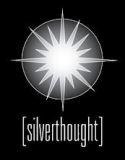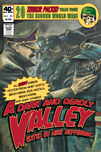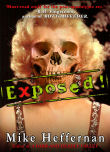DDV:
an interview with Mike Heffernan
by Russell Lutz, Associate Editor
interview conducted by email, 24 March 2007
Russell Lutz: Which came first: the stories or the idea for the anthology?
Mike Heffernan: The anthology. I'm a historian by trade, and a life-long horror fan. The two were bound to converge at some point.
My studies concentrated on the violence of the Second World War, how we've remembered it. It's relevant to our current geo-political climate. I wanted to tackle the topic with the best horror fiction had to offer and show its ugly, brutish colors—as a genre, we give it like it is.
RL: How much planning did you put into the ordering of the stories, beyond the obvious break point of the two sections?
MH: The division of the book into two sections came after I read a few of the stories. The violence of the war was the initial theme, but once we got rolling and I saw how eloquent some of the stories were which dealt with memory, I knew I had to expand on it and have some contributors re-jig what they were already doing.
But in terms of ordering, I wanted to take the reader through the chronology of the war. It just seemed like the only plausible route to take: a WW2 anthology which started with the Battle for Berlin and ended with the landing at Dunkirk couldn't have worked, for me.
RL: Some of the stories feature horror as an adjunct to war, while most show horror flowing directly out of war. There's very little of the "glory" of war, even though WWII is considered the last "good" war. Are you making a statement about the nature of war with your editorial choices?
MH: Actually, Korea was the last "good war." But, yes. When you study things like the Holocaust and war crimes, any and all of the glamour is sucked out of your immature notions of war. But even as a child, I never bought into the John Wayne post-war image; I saw war through films like Apocalypse Now, which depict it through the eyes of men driven mad by violence.
RL: There really is a potpourri of styles here, from stories with no supernatural component at all ("And the Worm Shall Feed"), to those with just a hint of the supernatural ("The Night is an Ally"), to overwhelming freakiness ("The Honor Guard"). Was this a planned aspect of the collection, or a happy accident?
MH: A little of both, maybe. But a balance from one story to the next is necessary, like with Wright flowing into Joyce, or how Joyce acted as a companion piece to Hodge.
The vast majority of my contributors were invited—I was very familiar with their styles, knew where they'd take various topics. And with the two reprints and one unsolicited submission, I was lucky: they fit seamlessly.
And I just wasn't interested in simple scares, cliché monsters, or revenge plots (I think that these guys are of such a high caliber that when you put an anthology like this together you don't necessarily have to point that out, anyway).
RL: I know you must like all the stories, or you wouldn't have included them in this anthology. But is there one or two of them that encapsulate what your goal was for the collection? In other words, if someone were to pick the book up in a store, what would you want them to skim first?
MH: That's a tricky question, and one I'm somewhat hesitant to answer, for obvious reasons.
If I were selling this to a wholesaler, or for mass market, I think Brian Keene might be the man to pimp. Or for academic interest, Mort Castle and Scott Nicholson.
But Brian
Hodge's story was my personal favorite; I think it's a masterpiece. A doom
hovers over it like an oppressive black cloud. Brian is one of those writers
that continues to reinvent himself, impress his readers, and transcend the
genre.
RL: Can you talk a bit about the collaboration with Paul Hughes at
Silverthought press?
MH: Paul has been a godsend. We've been working together for a few years now. It started when I submitted a few of my early stories to Silverthought, and blossomed when he did the copy editing on Aim for the Head (Overlook Connection Press). It was only natural that I pitch my own collection of shorts to him, as well as A Dark and Deadly Valley. To be honest, I never thought of taking them anywhere else.
RL: I see that you've started your own publishing company. Will you be editing all of the work yourself or will you continue to collaborate with freelance editors as you did with Hughes?
MH: Everything, from editing anthologies to graphic design, will be done in-house. Hard Ticket Press, as well as our horror imprint, Black Harbor Books, is a partnership between artist Darren Whalen and me. We hope to go full-time within three years.
But I'll take on other editors, primarily Paul, to handle copy editing. I just don't have the time, or the skill.
RL: I'm guessing that this collaboration rounded out your work in a multi-dimensional way as the work was perfected by the variant talents of two different writer/editors. Can you say more about the value of this process?
MH: I feel much more comfortable and confidant when I can rely on another editor for feedback. Particularly with this type of project. I may be selling it to the "horror" community, but I hope to branch out and reach other genre fans. To do this, the work has to be solid—one tiny hole and the whole damn thing could get sucked in. Paul was there to say, This works. This doesn't. That's not easy to find, unlike when you write: everyone's a critic.
Moreover, he put together one hell've tight looking book. No matter how great the prose is, a slick looking package makes it that much more enjoyable.
RL: Which brings me to my next question. Can you speak more about the notion of writer as editor? I'm guessing there is a certain bent towards allowing author autonomy. How did you balance the writer sensibility with the necessity to edit and cut?
MH: You can't separate the two. But when I look at where my career is going, where I want to end up, I see myself as more an editor. I like the idea of fostering a group of young writers, offering an avenue for genre vets to place serious fiction. I just want to help our genre grow, in some small way, and to get it out of the proverbial shadows.
I write character driven stories with quite horrors, with some exceptions. That's the type of stories I gravitate towards, as an editor and a horror fan. The trick is to just let your writers write their story, not yours. Once you receive a submission, you ask, How can this be better? I don't sit down with a red pen and start slashing. That's not my style. I offer general remarks, sometimes specific criticisms. Most times, the writer and I will come to some middle-ground.


